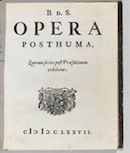
Selection from –Political Treatise - Chapter III, of the right of supreme authorities (Page 1)
Spinoza's Words – (general decrees of the commonwealth take precedence over individual rights)

We call men Citizens, as far as they enjoy by the civil law all the advantages of the commonwealth, and Subjects, as far as they are bound to obey its ordinances or laws. We have already said that, of the civil state, there are three kinds -- democracy, aristocracy, and monarchy. Now, before I begin to treat of each kind separately, I will first deduce all the properties of the civil state in general. And of these, first of all comes to be considered the supreme right of the commonwealth, or the right of the supreme authorities.
From what has been said previously it is clear that the right of the supreme authorities is nothing else than simple natural right, limited, indeed, by the power, not of every individual and thus each single citizen has the less right, the more the commonwealth exceeds him in power, and each citizen consequently does and has nothing, but what he may by the general decree of the commonwealth defend.
It can by no means be conceived, that every citizen should by the ordinance of the commonwealth live after his own mind, and accordingly this natural right of being one's own judge ceases in the civil state. I say expressly "by the ordinance of the commonwealth," for, if we weigh the matter aright, the natural right of every man does not cease in the civil state. For man acts according to the laws of his own nature, and consults his own interest.
Moreover, we cannot even conceive, that every citizen should be allowed to interpret the commonwealth's decrees or laws. For were every citizen allowed this, he would thereby be his own judge, because each would easily be able to give a colour of right to his own deeds.
We see then, that every citizen depends not on himself, but on the commonwealth, all whose 10 commands he is bound to execute, and has no right to decide, what is equitable or iniquitous, just or unjust. But, on the contrary, as the body of the dominion should, so to speak, be guided by one mind, and consequently the will of the commonwealth must be taken to be the will of all; what the state decides to be just and good must be held to be so decided by every individual. And so, however iniquitous the subject may think the commonwealth's decisions, he is none the less bound to execute them.
Comment:
Spinoza is at pains to say that men being as they are, prone to have their own way, would, if free to do so, interpret the laws to benefit themselves. This the state cannot let them do. He mentions the "10 commands" as a given that they are the basis of law for a civil society.